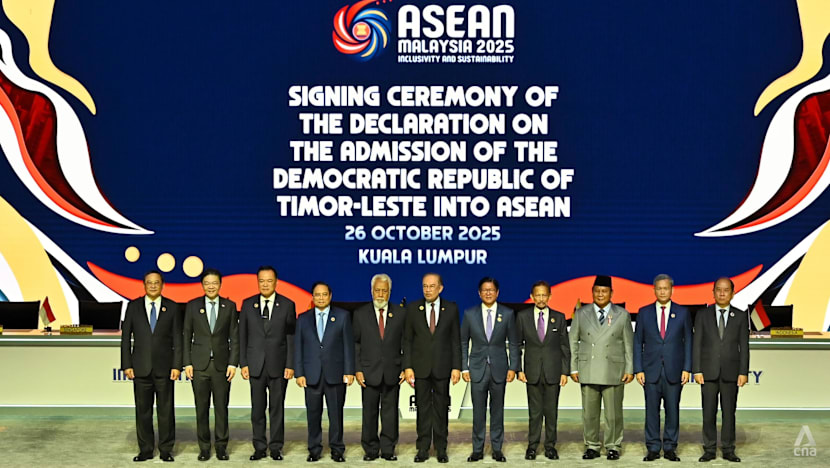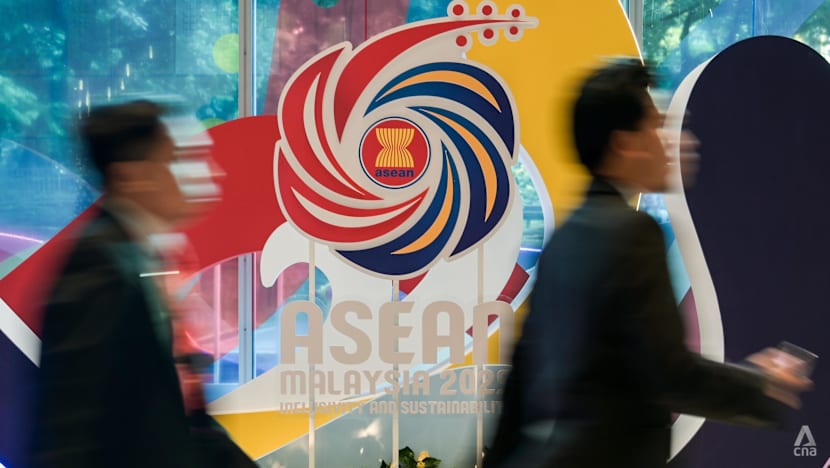ASEAN risks losing credibility if it fails to stay united, warns PM Wong
ASEAN must safeguard its centrality and demonstrate its ability to resolve differences and maintain peace among itself, said Singapore PM Lawrence Wong at the ASEAN Summit.

Singapore Prime Minister Lawrence Wong (second from left) and other ASEAN heads of state pose for a group photo during the opening ceremony of the 47th ASEAN Summit and Related Summits in Kuala Lumpur on Oct 26, 2025. (Photo: CNA/Zamzahuri Abas)

This audio is generated by an AI tool.
KUALA LUMPUR: The Association of Southeast Asian Nations (ASEAN) must “stand together as one” in an increasingly uncertain world or risk losing its credibility and relevance on the global stage, said Singapore’s Prime Minister Lawrence Wong on Sunday (Oct 26).
Speaking at a closed-door retreat session held at the end of the first day of the 47th ASEAN Summit in Kuala Lumpur, he said ASEAN must safeguard its centrality and demonstrate its ability to resolve differences and maintain peace among itself.
Mr Wong, in a transcript issued by the Ministry of Digital Development and Information on Monday morning, expressed hope for swift resolutions to both the recent border tensions between Cambodia and Thailand, as well as Myanmar’s ongoing political crisis.
Thailand and Cambodia had been locked in a border dispute, with tensions escalating in July into their deadliest military clashes in decades, killing more than 40 people and forcing around 300,000 to flee their homes.
Both sides agreed to a ceasefire on Jul 28 after talks in Kuala Lumpur mediated by Malaysian Prime Minister Anwar Ibrahim, the bloc’s rotating chair.
On the sidelines of the ASEAN summit on Sunday, an agreement to cease all hostilities at the disputed border area and release captured soldiers was signed by both countries.
Mr Wong commended Malaysia’s efforts in finding a diplomatic solution and welcomed the signing of the agreement. However, this is “only the beginning”, he said.
“There is still a long road ahead, and Singapore encourages both sides to exercise restraint to avoid any further escalation, and to resolve differences through peaceful engagement and dialogue, and established mechanisms.”
On Myanmar, which has been in turmoil since a 2021 military coup ousted the elected government of Aung San Suu Kyi and triggered an armed rebellion, Mr Wong said the immediate priorities are to de-escalate violence, facilitate humanitarian access and create conditions conducive for dialogue.
“A sustainable solution and lasting peace is only achievable through constructive dialogue and engagement amongst all key stakeholders, and we have all said this before, that any solution must be Myanmar-owned and Myanmar-led,” he said.
He noted that the efforts of the special envoy and the ASEAN Coordinating Centre for Humanitarian Assistance are important, and called for the appointment of a special envoy with a multi-year term “to provide continuity” after Malaysia.
The current special envoy is former Malaysian diplomat Othman Hashim, who took on the role in January. He is tasked with making progress on the Five-Point Consensus agreed by ASEAN in April 2021, which urges an immediate end to violence.
“Singapore will continue to support the efforts of ASEAN and the chair on Myanmar, including by implementing the Five-Point Consensus,” said Mr Wong.
Earlier in the day, Mr Wong also attended a closed-door plenary session for the ASEAN leaders at the Kuala Lumpur Convention Centre. The session, which took place after the opening ceremony, included the grouping’s newest member Timor-Leste for the first time.
With the summit taking place against the backdrop of profound changes in the world, the Singapore prime minister called for the bloc to do more in three areas to secure its future.
The first is to deepen integration and “endeavour to bring tariffs down to zero” within the bloc’s free trade area, he said, reiterating a point he made in May during ASEAN’s first meeting this year.
Beyond tariffs, businesses still face a complex operating environment in ASEAN and more can be done to help them operate seamlessly across the region, such as by bringing down non-tariff barriers and standardising rules and regulations.
Regional economies can also be brought closer together by linking up digital payment systems, capitalising on agreements such as the Digital Economy Framework Agreement, he said.

Second, new partnerships should be forged, said Mr Wong, citing interest from Canada and the European Union in pursuing free trade agreements.
New linkages will be more important, especially in a world where there will be more barriers to trade and investments, he added, urging ASEAN to stay open and “find ways to keep the major arteries of trade open”.
Lastly, Mr Wong noted the need for ASEAN to strengthen its resilience in the face of emerging threats.
These include raising citizens’ awareness and vigilance against cybercrime and online scams, as well as tackling public health issues posed by e-cigarettes and vaping products which “now move freely across (the) region”, he said.


















